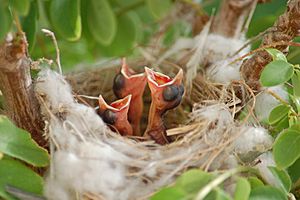Altricial facts for kids
Altricial describes animals that are born or hatched very helpless. They can't move around much on their own and need a lot of care from their parents. The word "altricial" comes from a Latin word meaning "to nurse" or "to nourish." This means these young animals need to be fed and protected for a long time before they can take care of themselves.
Think of human babies, for example. They are altricial because they can't walk, feed themselves, or even hold their heads up when they are born. They rely completely on their parents for everything! Many birds, like robins or eagles, also have altricial chicks that hatch without feathers and can't see or fly.
Contents
What Does Altricial Mean?
When an animal is altricial, it means it's not ready for the world right after birth or hatching. These young ones are often born with their eyes closed, without fur or feathers, and unable to control their body temperature. They depend on their parents for warmth, food, and protection from danger.
- Examples of Altricial Animals:
* Most songbirds (like sparrows, owls, and eagles) * Humans and many other mammals (like cats, dogs, and mice) * Marsupials (like kangaroos, whose tiny babies develop in a pouch)
This period of intense parental care helps the young animal grow strong and learn important survival skills.
What About Precocial Animals?
The opposite of altricial is precocial. Precocial animals are born or hatched much more developed and can move around and often feed themselves very soon after birth. They are like "early bloomers."
- Examples of Precocial Animals:
* Chickens and ducks (chicks can walk and find food almost immediately) * Horses and cows (foals and calves can stand and walk within hours) * Deer (fawns can run shortly after birth)
These animals usually have a shorter period of direct parental care compared to altricial species.
Why Are Some Animals Altricial?
You might wonder why some animals are born so helpless. Being altricial can actually be a good strategy for survival!
- Energy Saving: For parents, it can take less energy to produce many small, helpless young than a few large, developed ones. The babies then grow quickly outside the egg or womb.
- Faster Development: For birds, hatching early means the egg doesn't have to be incubated for as long. This can be safer if there's a risk of predators finding the nest. The chicks then develop rapidly once they are out of the egg and being fed constantly by their parents.
- Learning Time: For animals like humans, being altricial allows for a long period of learning and brain development outside the womb. This is important for complex behaviors and social skills.
Both altricial and precocial strategies have helped different animal species survive and thrive in their environments!
Images for kids
-
A California quail chick (Callipepe californica), which is a precocial chick, meaning it's ready to move soon after hatching.
-
A human baby. Humans are one of the best-known examples of altricial organisms, needing lots of care.





